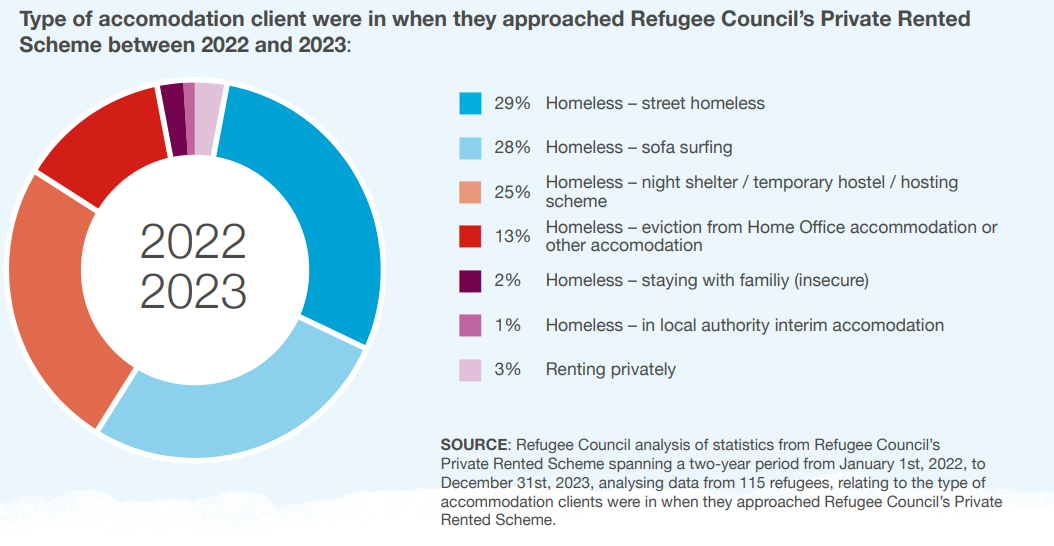Huge rise in refugees becoming homeless in England as charities slam ‘dysfunctional’ system
One Sudanese refugee was evicted from Home Office hotel with only a week’s notice and forced to sleep rough
Your support helps us to tell the story
From reproductive rights to climate change to Big Tech, The Independent is on the ground when the story is developing. Whether it's investigating the financials of Elon Musk's pro-Trump PAC or producing our latest documentary, 'The A Word', which shines a light on the American women fighting for reproductive rights, we know how important it is to parse out the facts from the messaging.
At such a critical moment in US history, we need reporters on the ground. Your donation allows us to keep sending journalists to speak to both sides of the story.
The Independent is trusted by Americans across the entire political spectrum. And unlike many other quality news outlets, we choose not to lock Americans out of our reporting and analysis with paywalls. We believe quality journalism should be available to everyone, paid for by those who can afford it.
Your support makes all the difference.The number of homeless refugees seeking urgent housing from English councils has increased by 239 per cent in the past two years, analysis shows, prompting charities to slam the “dysfunctional system” that leaves people living on the streets in tents.
A new report by charity Refugee Council reveals that the number of new refugees who are sleeping on the streets has surged. One in five refugees seeking help from their services were sleeping rough in 2022. But this has now risen to two in five refugees in 2023.
Asylum seekers are housed by the Home Office in hotels while their claims are being processed, but when they are granted asylum they are given 28 days to find somewhere new to live before they are kicked out. Some can have as few as seven days to find a new home because of delays in issuing documentation.
The number of asylum seekers in this position has soared in recent years as the Home Office pushes to clear the asylum backlog, resulting in a surge in newly granted refugees. Council housing services have struggled to cope with the influx, leaving many to sleep on the streets.
Last year, between July and December, 50,845 people were granted asylum – the highest number of grants on record and a 400 per cent increase compared to the same period in 2022.
Government statistics analysed by the Refugee Council charity show that in the two years ending September 2023, there has been a 239 per cent increase in the number of people requiring homeless support from local authorities after being evicted from Home Office hotels.

Some 970 families faced homelessness in England in the winter of 2021 after eviction from a Home Office hotel, but by the autumn of 2023, this had risen to 3,290 households.
The problem is particularly stark in London, which has a high refugee population compared to other areas. London councils reported a 234 per cent rise from September 2023 to January 2024 of people rough sleeping who had recently left Home Office hotels. Over 90 per cent of these people had received a positive asylum decision, meaning they have the right to live, study, and work in the UK.
The findings come as the Home Office announced that 150 asylum hotels will be closed by the beginning of May – delivering on their promise to reduce the government’s use of temporary accommodation.
Home secretary James Cleverly promised to “keep going until the last hotel is closed”.
One Sudanese refugee, Yahya, 25, waited almost three years for a positive asylum decision and was then told to leave his Home Office hotel with only a week’s notice. He was forced to sleep rough for around 10 days before finding help from the charity.
He said: “When I received my decision, that I have leave to remain in the UK, I decided to study, to do a motor vehicle course – to be a mechanic. But after I received an eviction letter from the Home Office it was hard, I was living on the street ... I had to leave the asylum accommodation in one week.”
He explained that he would be penalised if he didn’t turn up to college so he was sleeping on the streets at night and going to college in the morning. “For almost 10 days I was sleeping rough. When I was sleeping on the street, some people, they can grab your bag, when you have some important papers inside, your ID and your decision papers.
“All night I couldn’t sleep, I tied my bag to my body. I know so many refugees who are sleeping on the street, still they don’t get any help. One of my friends has been there more than a month – people from Eritrea and Sudan.”

Tom Cottam, head of policy for the British Red Cross, said: “Every day, we’re supporting people who are facing life on the streets once they get their refugee status, because they’re not given enough time to find work and housing. This includes people with physical and mental health needs.”
The British Red Cross is calling on the government to extend the notice period given before hotel eviction to 56 days.
Between August 2023 and March 2024, four in 10 of the people the British Red Cross supported with cash-based assistance were facing destitution because of the move-on process.
Refugee charity Care4Calais said: “Habitable housing, embedded in communities, provides the best foundation for those granted refugee status, who only want to integrate into society and move forward with their lives.”
Enver Solomon, CEO of the Refugee Council, said that new refugees were being set up “to fail from the very start”.
He added: “A mere 28 days to get on their feet and find a private tenancy with no income and no savings is completely unrealistic. This dysfunctional system is causing an entirely avoidable crisis of homelessness and destitution.”
The charity is calling on the next mayor of London to set up a fund to cover tenancy deposits for new refugees in the capital, and is also asking the government to extend the move-on period to at least 56 days.
A government spokesperson said: “Once a newly recognised refugee is issued a biometric residence permit, they get 28 days to move on from asylum accommodation.
“Support is also available through Migrant Help and their partners, which includes advice on how to access universal credit, the labour market and where to get assistance with housing.
“We are working to make sure that individuals have the right individuals they need following an asylum decision, and to help local authorities better plan as we reduce the number of asylum seekers awaiting a decision.”
